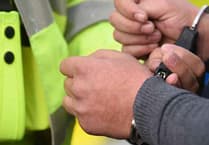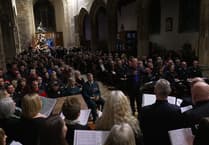Ahead of Valentine’s Day tomorrow, many people across North Wales will be thinking about dating online, but a warning has been issued to people to be on their guard on dating sites.
North Wales Police and Crime Commissioner, Andy Dunbobbin, and the Economic Crime Unit of North Wales Police are joining forces to warn residents to be on guard against romance fraud and to look out for criminals who might be more interested in swiping someone’s money than sweeping them off their feet.
Dating websites and apps are one of the most popular ways to meet new people. But unfortunately, among the genuine profiles, there are fake profiles created by criminals whose intention is to manipulate, take advantage and trick people into handing over money. These fake profiles are designed to appear attractive and use images stolen from the internet to disguise the scammer’s true identity.
With this in mind, the Commissioner and North Wales Police are calling on people to think Stop, Challenge and Check this Valentine’s Day:
· Stop – never send money to someone you have met online, no matter the reason they give.
· Challenge – don’t be pressured into moving away from an official dating site.
· Check – think carefully about what you are being told and if there is any way to verify the information you have.
There are several warning signs that point to an online acquaintance being a fraudster, one of which is the current situation they claim to be in. Typically, a criminal will say they are abroad in a remote country, working on an oil rig, in the army or are in another line of work that makes it difficult for you to verify if what they are telling the victim is the truth.
Another indicator is the speed at which the relationship develops. They will be very flattering, attentive and speak of the relationship being romantic within a short period. They will message the victim frequently, building trust and emotional attachment, and may even discuss a personal problem they have to gain sympathy.
They may also suggest moving the conversation away from the official dating site or social media site to a more secure messaging service. Romance fraudsters will often talk about a future together, appearing eager to meet in person, but they will provide a range of excuses as to why a meeting can’t take place. They may also be reluctant to take part in a video call or voice call and insist on the conversation taking place by message only.
Eventually the fraudster will begin asking for money to help with a fabricated issue they have and will manipulate the victim into feeling guilty if they do not comply with their request, using emotional blackmail and a sense of urgency.
The victim may also be asked to accept money into their bank account from another source to send to the suspect. In these circumstances the money is likely to have come from another victim of fraud and the victim is being used to launder money, which is a criminal offence.
Andy Dunbobbin, Police and Crime Commissioner for North Wales, said: “Online dating has become ever more popular in recent years and most of the time it’s harmless and good natured. But as well as the genuine romance seekers on these sites, there are also romance fraudsters who are heartlessly looking for their next victim.
“I am pleased to be working with North Wales Police’s Economic Crime Unit to make people aware of the dangers and to warn them to be on their guard against criminals who take advantage of vulnerable members of our community. A genuine love interest wouldn’t ask for money or pressurise you into doing something you are uneasy with. So stay safe online, ensure the person you are speaking to is actually who they say they are, and don’t fall prey to a romance trickster. Remember to always Stop, Challenge and Check!”
DC Rachel Roberts, Financial Abuse Safeguarding Officer, North Wales Police, said: “Since the pandemic we have seen a significant rise in the number of romance frauds reported. It is believed that criminals who commit this type of fraud operate within organised crime groups and they are extremely convincing, using specific tactics they have developed over time to isolate and manipulate their victims.”
“I speak with many victims who find it hard to accept that everything they have been told it a lie and this, coupled with a large financial loss, can be devastating. I would urge everyone who meets others online to be on their guard and refuse any request for money. It is important to remember that, as well as the distress caused to victims here in North Wales, the money being sent to these criminals is used to fund further crime, including human trafficking, drug offences and even terrorism.”
PC Dewi Owen of North Wales Police’s Cybercrime Team, which forms part of North Wales Police’s Economic Crime Unit said: “If looking for love online beware of requests to move conversations away from the dating apps or websites onto more private channels such as email, text or instant messaging.
“Research the person you’re talking to as profile photos may not be genuine and be alert to inconsistencies in stories. You can check if the person you are talking to is really who they say they are by reverse image searching their profile picture, which is possible on the search bar of some image search engines.
“If you think a friend or family member has become a victim of romance fraud, speak to them about your concerns and encourage them to report the matter to Action Fraud and/or the Police. The victim can often be the last to realise what’s happening as Romance fraudsters can be very convincing.”
A 68-year-old female in North Wales recently fell victim to romance fraud. During the summer of 2022, the victim’s daughter contacted North Wales Police reporting that her mother had met someone online and that he had subsequently asked for money. The informant suspected that the victim had already sent over £12,000.
Officers attended to speak with the victim. The victim explained that she had been in contact with a number of males who she had met online playing a game called Wordley.
One of the males sent her an image of an injured person in hospital, claiming it to be a picture of himself, and requesting money for hospital bills. Another male told her that he was a doctor in Iraq and needed money to get out of his contract with the US Army so that he could return home to his
daughter. Another male told her that he had an inheritance owed to him by the Turkish government and the victim was asked to pay £20,000 in legal fees to release millions of dollars.
The most recent suspect had been in contact with the victim for about a year and had requested money throughout that time. He had told the victim that he worked on an oil rig off the coast of Scotland but was originally from the USA. He seemed to be aware of a previous financial loss the victim had suffered and offered to help her get her money back by putting her in touch with a friend in the FBI. This led to the victim believing that he was genuine and would be able to help her.
The victim had sent money to the suspect to arrange transport off the rig so that they could meet, but the suspect had repeatedly cancelled for various reasons. He had even sent the victim emails claiming to be from his 9-year-old daughter asking for money.
The victim was also told that the suspect had damaged equipment on the oil rig, which he was expected to pay, for but he claimed he had lost his phone and wallet at sea, so his bank accounts had been blocked. He asked the victim to loan him the money to get back home so that he could pay for the repair of the equipment. The victim was reassured that he would pay her back once he had returned home from the rig. In order to help the suspect, the victim took out loans and credit cards and, in total, sent him over £12,000.
After initial contact with officers the victim refused to accept that she was a victim of fraud. Further contact was made with the victim by the Financial Abuse Safeguarding Officer who was able to prove that the images she had been sent of the suspect, as well as various documents he had sent her, were fake and that the funds she had sent had been transferred out of the UK, making them impossible to recover. Eventually the victim accepted that she had been the victim of fraud. She was advised to cease contact with the suspects, to stop sending money and not to accept money from others she did not know. Ongoing support was offered from Victim Support and her family members and her bank were also made aware so that her accounts could be protected.
If you become a victim of romance fraud and the fraud is in progress and there are suspects present, report direct to North Wales Police on 101 or if it is an emergency dial 999. Otherwise, you should report the matter to Action Fraud on 0300 123 2040 or at www.actionfraud.police.uk. Action Fraud are the national reporting centre for fraud across England and Wales.
The Victim Help Centre, whose work is commissioned by the North Wales Police and Crime Commissioner, is here to listen and offer support, and you are encouraged to use their services. With their specialist knowledge they can:
· Help people look at ways of claiming back any lost money
· Help people build resilience to prevent any further crimes
· Provide personalised support
· Listen with compassion and help people find ways to manage and feel safer
· Act as an advocate when complaining to a bank or the financial ombudsman (with the victim’s consent).
The staff at the centre understand the embarrassment and shame that victims feel after experiencing fraud. Some people blame themselves, but victims are not to blame.
Please don’t hesitate to contact the Victim Help Centre if you’ve been a victim of fraud and would like to know more about how they can help you.
If you’ve been affected by fraud in North Wales, call your local Victim Help Centre team on 0300 303 0159. Opening hours are: Monday to Friday 8am-8pm and Saturday 9am-5pm.

.jpeg?width=209&height=140&crop=209:145,smart&quality=75)



Comments
This article has no comments yet. Be the first to leave a comment.